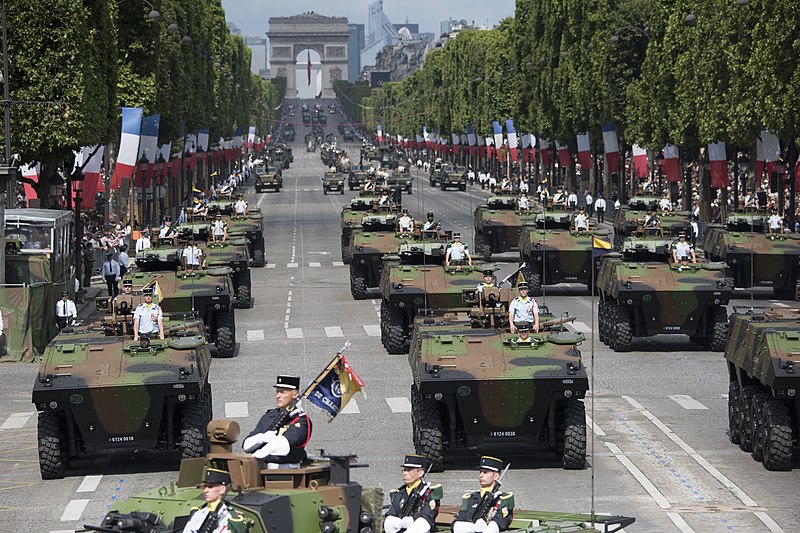Bayard & Holmes
~ Jay Holmes
Last week, the French government released its outline for future defense strategy and spending. The presentation made it clear that the Macron government wishes to cut its defense budget, concentrate on high-technology advancements, and reduce manpower. When questioned about the feasibility of the force reductions at a time when the French military seems to be busier than it has been in recent decades, a French military spokesman, on behalf of the French Ministry of Defense, stuck to a tightly-scripted play book.
Notably, he did not deny that the restructuring would be inadequate for France’s national security needs. Instead, in a rare instance of political honesty, he said that in the future, the French would rely on “more privileged countries like the UK and USA to provide the necessary manpower.”

French military parade on Bastille Day — soon to be outsourced?
Image US DOD, public domain
That statement was brief and seemed to slip right past the “privileged countries” that France says would have the privilege of sending their flesh and blood to defend France.
However, in spite of the lack of coverage by the US and UK media, it did not quite go completely unnoticed, as in, Piper and I noticed it. We get it. Everyone gets tired of adulting sometimes. These days, politicians commonly woo voters with promises of cradle-to-grave dependence on the “more privileged,” but it’s unusual that a country would actually admit that it expects cradle-to-grave dependence on other countries to provide its defense, so we believe it is worth examining France’s strategic vision more closely.
In a world controlled primarily by despotic nations that offer little freedom and little hope for the future, Western Europe matters. If France were surrounded by allies with more military power, then it would perhaps be less important that France is actively planning on a strategy of military inadequacy, as their neighbors could rush across the border to assist whenever needed. Unfortunately, that’s not the case.
A country’s Gross Domestic Product (“GDP”) is a standard measure for arguing military spending by NATO member nations, and while this article does not pertain directly to the ongoing NATO debate, percent of GDP spent on defense gives us a legitimate measure. We can optimistically claim that France’s commitment to its national security is backed up by defense spending in the neighborhood of 2.3% of its GDP. However, their allegedly powerful neighbors in Germany only have a defense budget on the order of 1.4% GDP. To France’s southwest, the Spanish have risen from a laughable 0.8% GDP to a still-pathetic 1.2% GDP spending on defense. While a nation’s defense spending as a percent of GDP cannot tell us everything about the quality of its military, it does tell us what that particular nation’s commitment is to national and, in the case of Western European nations, international security.
That said, the numbers change depending on who you ask and who is doing the asking. I am using the numbers that seem to me to be most reliable, based on a combination of what each country most frequently admits and what third-party analysis by groups such as the Stockholm International Peace Research Institute provide. In any case, everyone’s estimates indicate that France’s closest neighbors are in no position to substantially reinforce them.
In the case of Germany, the government and defense industries are partnering closely in hopes of completing more lucrative foreign sales while ignoring the Germany military’s own desperate need for parts, new equipment, and maintenance.
For example, the German Navy has accepted responsibility for submarine patrols in the Baltic Sea—a critical commitment to NATO and Western security in this age of Putin Imperialism. Germany designed and built six submarines optimized for operations in the relatively shallow waters of the Baltic and it allocated suitable manpower. That in itself was no small expense, as skilled submarine crews are so difficult to recruit and train. Unfortunately, Germany did not maintain those submarines due to lack of dry dock time and insufficient parts production. As a result, if the German submarine forces had to put to sea tomorrow, they likely could not keep a single submarine at sea for more than ten days.
You heard correctly—the Germans famous for the U-boats now are not capable of keeping even one submarine operational at sea for more than a handful of days.

Stranded German U-boat 1921 — Who knew this would be the standard in 98 years?
So why didn’t Germany allocate adequate dry dock time and produce parts for the critical maintenance of its submarines?
Because German shipyards were occupied with rushing through construction of new submarines for Israel. That was good news for the Israeli Navy and for German industrial giants. It was bad news for the German submarine force, for NATO, and for Germany’s self-defense.
The German Luftwaffe is in better condition, but it is still not in adequate condition. Due to a shortage in maintenance budget and parts, an undisclosed number of Germany’s planes are not operational at this time. All air forces have planes down for maintenance on any given day, but in the case of the German Luftwaffe, the numbers are so dismal to German taxpayers and NATO partners that Merkel’s government prefers not to announce them.
As for Spain, its current government is claiming that it intends to increase defense spending substantially over the next six years to address its many shortfalls in equipment and operational abilities. Also, in the last two years, Spain has been more willing to provide Spanish personnel to counterterror operations around the world. Like France, Spain, too, maintains garrisons of elite forces in North Africa in locations such as Ceuta and Melilla. However, the Spanish military currently lacks both sufficient financial and popular support to fulfill its strategic vision. The lack of popular support leaves us wondering if its current and next governments will actually complete Spain’s defense rebuilding goals. What we do know, though, is that in its current state, Spain can only minimally contribute to the defense of Europe.
So then, how about those “more privileged” countries? As far as I know, neither the United Kingdom nor the United States were consulted about France’s new strategy of planned inadequacy. In fact, I am quite certain that they were not consulted. For that matter, the Macron government did not even do much consulting with its own military leaders.
The Macron government operates on the assumption that everything that the French military needs to know about military matters is what Macron tells it. French military leaders can either support the government’s positions and fantasies, or they can find new careers. Macron and his ministers do not wish to waste their time by listening to the military opinions of generals and admirals.
It’s not difficult to guess how the current US administration will respond to France’s cute little plan to let Americans provide the French with manpower for their defense. I do not represent the opinions of the US government. I assume that the US administration will respond quietly.
How the UK government responds, though, is of no great consequence. The United Kingdom currently spends only 1.8% of GDP on defense—an even worse defense spending record than France. Also, the United Kingdom, similar to Germany, has currently failed to provide its Navy with the ships that it will need to complete its missions.
I respect the sailors of the UK Royal Navy. They are excellent, but they can’t perform miracles. They need the ships and manpower to complete the missions that the UK government claims that it wishes its navy to complete. Also, while the UK Royal Air Force is in a much better condition than the German Luftwaffe, it has suffered funding cuts to programs that the UK government considered essential. As a result, the Royal Air Force has fewer planes and drones than the UK government agreed that it needs.
However, a closer look at France’s military systems does offer a somewhat brighter picture.
France has been successful in small antiterror operations in Africa, even with a low budget and poorly-performing helicopters. Lacking helicopters when operating far from any major bases in rugged and remote areas is no easy task. War is easier with adequate airborne resupply and close air support. Enemy strongholds are not particularly bothersome once an air force has been kind enough to drop the proper ordnance on their locations. Without those advantages of adequate helicopters and air support, a country like Chad is a much more daunting theater of operations. The French Army deserves credit for succeeding there, and the French government deserves credit for sending its army there.
France has made good use of two critical advantages in their operations in Africa. First, France has enough personnel overall to enable a system that includes large numbers of forces that specialize in geographic areas. That allows the French to better prepare and shape operations in hostile environments. Second, having forces specialized in geographic areas allows France to pursue a tactic of what we might call “vertical intelligence delivery.” That is to say that the private on patrol is almost as well-informed of all useful available intelligence in his area of operations as is the regimental commander. This greatly minimizes the chance of small patrols unwittingly drifting into ambushes. It also helps the soldiers to establish better relationships with the locals. Both of these advantages will be impacted with force reductions, which will make it more difficult for France to maintain this regional expertise.
The one exception might be the French Foreign Legion. The Legion is excellent, and it will remain viable in the foreseeable future, though it is limited in size, equipment, and logistic support and can only do so much with what it has.
So how do we form a reasonable view of what the future of Western European defense spending and strategy will look like? Understanding the money and politics might clarify things a bit. Let us glance at a few European cases.
France claims that it is emphasizing high-tech equipment upgrades because that will allow it to operate a smaller, but equally effective, military force. There is perhaps some truth to this, but the more obvious reason is that France wants to focus on foreign military sales rather than its own defense. In particular, the French government intends to quietly keep French defense industries successful and profitable by supplying Mideast and African nations with military equipment. Those French companies would be happy to sell their wares to just about anyone, but they have been most successful in recent years with sales to Saudi Arabia and the Gulf States. Helping to build other nations’ defense forces is more profitable than building their own.
Italy is more direct about its intentions to market its ships and other military equipment to any buyers with cash.
The Italian defense corporations make no secret that they intend to complete as many foreign sales as possible, and that their product designs are emphasizing foreign sales as opposed to the needs of the Italian military. As for the Italian government’s defense strategy and planning, those are easy to understand on any given day, but one might not wish to put in even that minimal effort to do so, as tomorrow they will change again.
The German government currently feels that it is important to give the appearance of being highly restrained in foreign military sales.
German corporations attempt to be less public about their foreign marketing efforts than the Italians or the French. The reality is that German ships, tanks, guns, and the occasional Eurofighter are all for sale to those who have the cash. The buyers just need to reassure the Germans that the armaments will not be used to kill anyone, because the German government likes to maintain the illusion that munitions are to be used for peace, not for war.
The underlying assumption in Western Europe is that it is not currently under threat by any peer or near-peer forces.
In the case of France, it will continue to rely on the bedrock of Gaullist military thinking, which is to maintain a viable nuclear force to deter Putin, Kim, or anyone else from conducting all-out military operations against them. Young readers might find that approach strange and a bit simpleminded, but France, along with the United Kingdom, sees its nuclear weapons as a viable national security insurance. This Gaullist approach is as ingrained in French military planning as it is in UK, US, and Russian military planning. Western European countries overall, however, assume that terrorist attacks will continue, and they intend to maintain adequate military forces to deal with that threat.
From the US and UK points of view, there would be no benefit in reacting too strongly to France’s “let the United States and United Kingdom defend us” strategy. The Macron government is speaking to its voters rather than addressing strategic realities.
The Yellow Vests are on the verge of storming the Bastille in their opposition to Macron, and Macron and his handlers have to invent something that sounds like good news to the French working class voters while pretending to give a damn about them. France and NATO have weathered worse storms than the Macron wind storm. They will survive Macron, as well.
In reality, the only thing new in France’s strategy statement is that it is actually admitting to what we already knew—that France is unwilling to carry the burden of its own defense and instead is willfully dependent on its allies. Prepare for the status quo to continue, but maybe don’t stand between Macron and the Yellow Vests.
* * * * * * * * * * * * *

What do the main intelligence agencies do and where do they operate? How do they recruit personnel? What are real life honey pots and sleeper agents? What about truth serums and enhanced interrogations? And what are the most common foibles of popular spy fiction?
With the voice of over forty years experience in the Intelligence Community, Bayard & Holmes answer these questions and share information on espionage history, firearms of spycraft, tradecraft, and the personal challenges of the people behind the myths.

Very nicely done piece, Piper. While I’m not astonished that Macron would say this–domestic politics always rules–he must know that Trump’s reply is going to loud and rude. And in this case, I would find myself agreeing with Trump–it was an exceptionally arrogant assumption for Macron to make. That said, American weapons makers will surely be happy at the thought of more control over Western Europe’s defene. That seems to be all any politician is interested in any more in any nation–not a military for defense, but a military industrial complex to churn out profits. Ike was spot-on, then and now.
Hello Shane. Thank you for your comment. I am not sure if Trump will publicly respond to France’s long range defense plans. We shall see.
You are right about defense corporations having too much influence on defense policy. It’s true in the United States and three times more true in Western Europe.
Cut back on national defense while allowing Muslim terrorists to immigrate freely. What could possibly go wrong with this plan?
Hi David. Unfortunately for French citizens, it frequently does and has gone wrong. Most Western media outlets have not covered the majority of incidents that have occurred in France.
Thank you for your comment.